Crypto asset custodian platform Bitgo unveils stablecoin USDS. Will it inch a share of the crowded stablecoin segment dominated by USDT and USDC?
The stablecoin segment is witnessing accelerated activity, with US crypto custodian platform BitGo the latest entrant to the fray. Dubbed USDS, Bitgo unveiled the US dollar-pegged coin on Wednesday, Sept. 18. BitGo explained the coin prioritizes fairness, neutrality, and transparency.
BitGo Offer USDS Stablecoin
BitGo’s official statement assured the USDS availability at the onset of 2025, with users earning rewards. The USDS launch emerges as the California-based company appears to take on the US’s largest crypto exchange Coinbase, over new crypto products.
A glance into last week’s activities saw the San Francisco-headquartered Coinbase unveil its wrapped Bitcoin (cbBTC). The new coin is pegged 1:1 to BTC, and its usability is viable on Ethereum and the Coinbase-incubated Base L2 network.
The Coinbase cbBTC emerged days after BitGo, the WBTC custodian, revealed a partnership with the Hong Kong-based BiT Global. The alliance will facilitate the diversification of cold storage and custody operations in various jurisdictions for the WBTC.
The BitGo initiative stirred controversy given the existing links of BiT Global and crypto entrepreneur Justin Sun. Sun is regarded as a controversial founder behind the Tron network.
BitGo enters the highly competitive stablecoins ecosystem that Coinbase, a critical player that helped create USD Coin (USDC). USDC is the second-largest dollar-pegged token that also allows investors to earn yield through their crypto exchange accounts.
BitGo statement illustrates the stablecoin market is dominated by the players prioritizing profits over facilitating the ecosystem growth. The custodian platform adds that it will back the USDS with short-duration T-bills, cash reserves, and overnight repurchase agreements (or repos).
The firm assured independent auditing of the USDS reserves by the top-tier accounting firms. Nonetheless, BitGo has not disclosed the audit firm among the PwC, EY, Deloitte and KPMG.
Stablecoins involve a uniquely digital token, predominantly the US dollars. The stablecoin facilitates traders in moving money without utilizing conventional banks. Also, stablecoins shield holders from the volatility that engulfs most cryptocurrencies.
Stablecoins wars are evidence of the tokens emerging as the backbone of the crypto asset economy. Tether (USDT) ranks as the third largest crypto by market cap, with USDC Sith-ranked. The USDT 24-hour volume hit $38.7 billion, trailed by USDC at $4.67 billion per CoinGecko data. USDT’s 24-hour trading volume surpasses Bitcoin’s $25 billion.
Despite the popularity of stablecoins, they have become a controversial asset within the space. The regulators attempt to control the opaque segment, with banks warning that stablecoins threaten financial stability.
Fierce Competition in Stablecoin Segment
Critics of stablecoins have termed such projects as risky when experimental as witnessed when Terra network blew up the algorithmic stablecoin. The UST suddenly lost the dollar peg in a collapse that nearly plunged every digital coin into its lows.
Tether has recently been a target, with critics challenging its reserves claims as not independently audited by the top-ranked accounting firm. Nonetheless, Tether issues attestation reports and transparency data. Recently, Tether hinted at attempts to establish a relationship with a firm to audit the reserves.
The controversy of Tether reserves led to its exit from New York in 2021 after the attorney general investigation found false statements.
Tether dominance faces a threat from new extrants and expansion since PayPal’s payment service unveiled stablecoin issuance. Besides BitGo, Ripple aims to enter the fray in the coming weeks.
Also, London-based fintech firm Revolut is set to roll out crypto trading backed by its own stablecoin. The UK firm affirmed its expansion ambitions, though prioritizes a compliance-first approach as it gears to proving a safe harbor for the crypto community.
The entry of BitGo, Ripple, and Revolut into the stablecoin space is set to underscore the capability to bank without borders.
